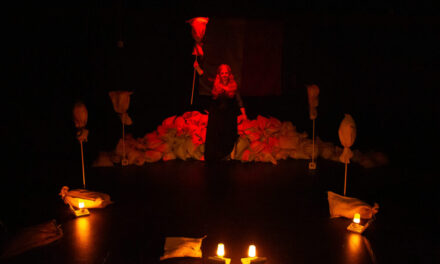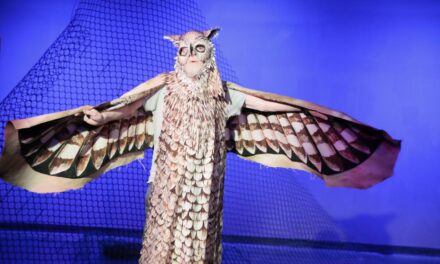Camp is very much in season in Circle Jerk, a pitched-to-the-rafters romp from new media and theater collective Fake Friends. The show bills itself as an investigation of digital life and white supremacy. Notable talent is on display in an evening that ultimately overextends that intriguing premise. With more frenzy and less wry wit than source inspiration What the Butler Saw, this uber-queer farce proves a bit knowing and overheated for its own good. Humor this broad and kitschy is tricky to sustain for a full-length performance that seems padded with two brief intervals. The latter portion indulges in cinematic devices such as a triptych screen that risks gimmickry by overuse. Then there’s the matter of an extended riff on race politics indicating philosophical ambitions that the frenetic tone struggles to provide with an adequate launching pad.
Still, the evening has its merits, particularly those actors who embody the necessary grounding in character work that lures us into their skewed world and keeps us engaged. The sets are also evocative and crisply authentic. The emcee is amusing as a tour guide and overall commentator on the proceedings. Camp is most effectively employed in his isolated, solitary setting. The wigs and costumes are also vivid and effective in revealing character. A highlight is an antic bit where astute actor Patrick Foley plays two characters, one with wig, in the evening’s funniest sequence. His hijinks are reminiscent of the indelible restaurant scene in “Mrs. Doubtfire” with Robin Williams juggling two simultaneously dinner engagements. The script’s funniest line is a bon mot about Method acting and fake news sharing Russian origins. When the dialogue later turns to an elliptical discourse on race is when the evening starts to lag.
This year of shuttered theaters, from Broadway on down, presents an opportunity to reimagine what live performance can resemble. The roaming narrator at the beginning signals an embrace of this macro-staging that’s possible when a performance is experienced from one’s screen. The show’s increasing turn toward actors interacting with onscreen characters in the third section sufficiently blurs the line between stage and screen to beg the question: Why not label “Jerk” a film? Fake Friends outwardly embraces media and it’s worth considering how “Jerk” might be staged differently if it was available for viewing in a live venue.
Co-creators Patrick Foley and Michael Breslin not only wrote the script, they also play multiple roles in an impressive acting feat. Of the many characters they portray it is the actor character who is the evening’s most problematic. He is aimed too close to a retrograde stereotype of the libidinous, feathery voiced femme to transcend caricature and embody woke queer theory discourse because he fails to tell us anything new that would justify Breslin’s masochistic portrayal. Foley’s drag emcee is a more successful portrayal because the role is clearly delineated as a type that is easily embraced, played for laughs, and unlikely to be viewed as an offensive trope. Embroiling Breslin’s fey thespian in a surreptitious romance with a white supremacist as a nod to currency is a provocative plot thread more daring than it is enlightening.
If cinema is the show’s birth mother and it’s being presented onscreen, what exactly is “Jerk’s” theatrical heritage? That’s a question this performance seeks to examine, with its topical dialogues about issues of ethnicity and bigotry and its most entertaining sequence, the sci-fi spoof. The night ultimately belongs to standout performer Cat Rodriguez. She’s tasked with handling the lengthy monologue on race from a most refreshing angle, Latino. Perhaps the writers’ most adroit decision was to illuminate the pervasive race discourse of BLM and instead, pivot toward how Brown Lives Matter. Rodriguez is ultimately largely confined to a screen, a questionable choice for such a dynamic actor.
Intriguing ideas are touched on in Circle Jerk and the actors and visual team are gifted. A flashy title such as Circle Jerk might ultimately be a disservice to a show that seems to want to offer something more substantial, beneath its surface sheen, than a group wank or forum. The press materials are rich in intellectual rigor and intent that would more effectively transmit with a bit of onstage exposition or more focused dramaturgy. As it stands, “Jerk” is promising more than it is fulfilling.
This post was written by the author in their personal capacity.The opinions expressed in this article are the author’s own and do not reflect the view of The Theatre Times, their staff or collaborators.
This post was written by Jack Wernick.
The views expressed here belong to the author and do not necessarily reflect our views and opinions.

















